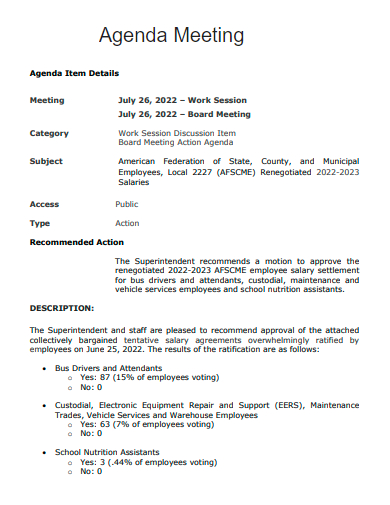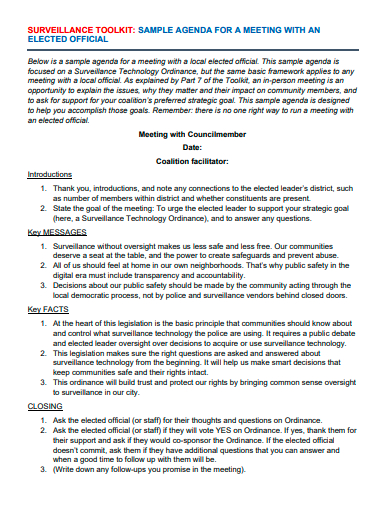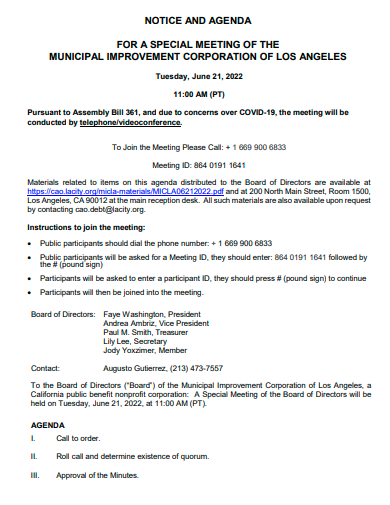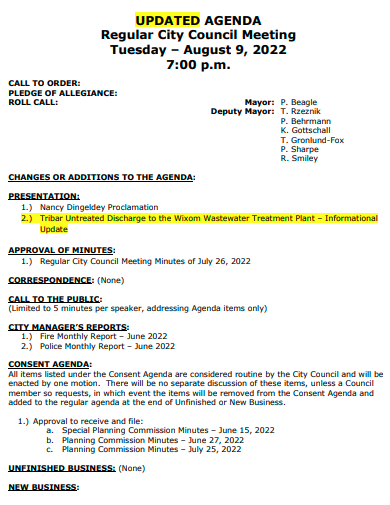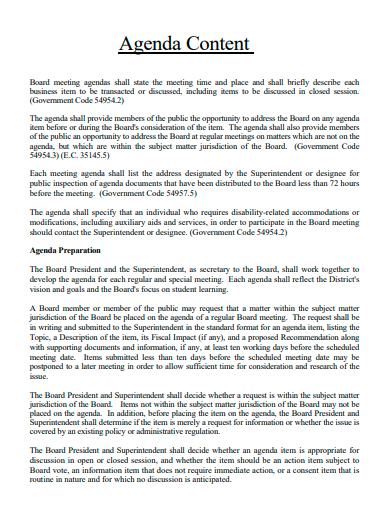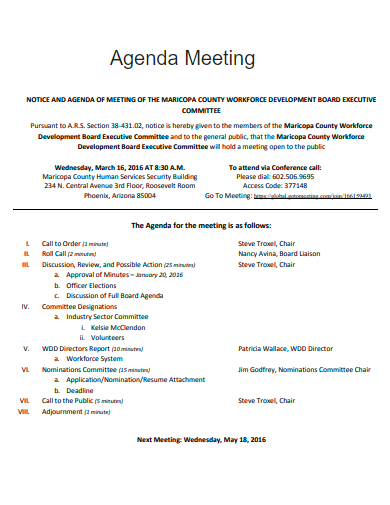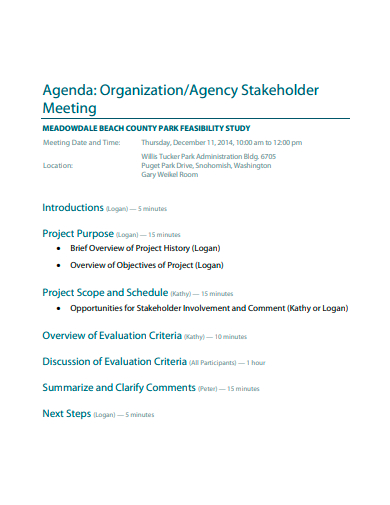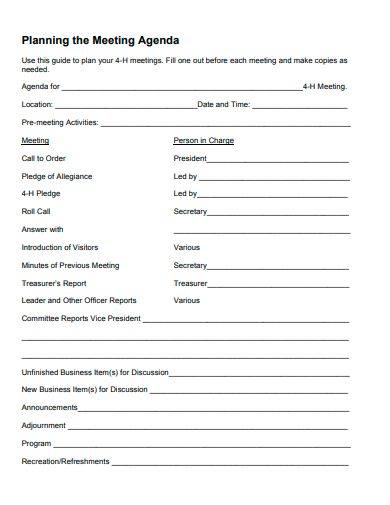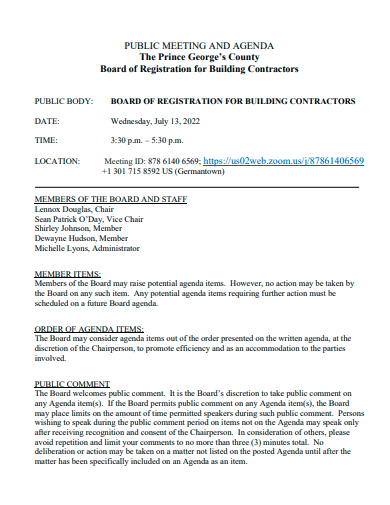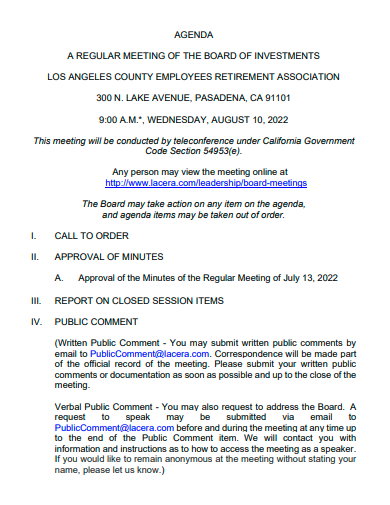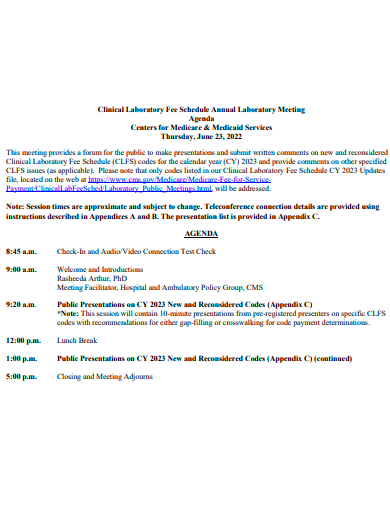When members of your new staff or coworkers attend a formal meeting, they do so with the expectation that it will be well-run, result-oriented, and filled with relevant discourse. If that hadn’t been the case, the meeting could have been an email. The possibility of this occurring is significantly increased when preparations have previously been made to draft an efficient agenda for the company meeting. Before bringing everyone together for a meeting appointment, it is of the utmost importance to have a plan or schedule drawn up for the discussion that will take place.
FREE 10+ Agenda Meeting Samples
1. Agenda Meeting Template
2. Sample Agenda Meeting
3. Notice and Agenda For a Special Meeting
4. Agenda Regular Council Meeting
5. Agenda Content Meeting
6. Agenda Meeting in PDF
7. Agenda Organization Meeting
8. Planning the Meeting Agenda
9. Agenda Public Meeting
10. Agenda Meeting of Board of Investments
11. Agenda Laboratory Meeting
What Is an Agenda Meeting?
An agenda meeting is a list of subjects or business activities you wish to discuss during your session. The primary business goals of the agenda is to provide attendees with a detailed breakdown of what should occur during the meeting. Besides, it also includes who will be in charge and how much overtime request should be allotted for each stage. If you have access to this information both before and during the meeting, you should be able to ensure that it moves forward quickly and effectively. Thus, it is vitally essential for the success of your team meeting.
How To Make an Agenda Meeting?
The possibility of this occurring is significantly increased when preparations have previously been made to draft an efficient agenda for the client meeting. Before bringing everyone together for a meeting, it is of the utmost importance to have a plan or agenda drawn up for the discussion that will take place. In order to assist you draft an agenda for your meeting, whether it is a brief one-hour meeting or one that lasts for the entire day, you can use the following steps as a guide:
1. Determine Your Purpose
When you begin with your target, you can make sure that all attendees understand the purpose of the meeting. Ensure that each activity you plan to discuss is pertinent to achieving your goal. To make it more productive as it can be, you must establish a target that can be attained. For instance, setting a target to approve the monthly advertising budget for the company is a more feasible objective than setting a goal to reduce spending overall.
2. Request Feedback
If you want your attendees to remain involved throughout the meeting, you should solicit their feedback to ensure the gathering caters to their specific requirements. You might ask them what questions they have or what areas they would like covered and see what suggestions they provide you.
3. List The Queries
Make a list of the questions you need to answer during the meeting once you have determined the purpose of your gathering and have a general concept of the subjects and topics you want to discuss. On some meeting agendas, a topic is presented in the form of a single phrase, such as “rental equipment.”
4. Determine The Purpose of Your Tasks
Every activity you carry out throughout the meeting should serve a specific objective. Sharing information, soliciting other people’s opinions, and settling on a course of action are often the three primary goals.
Where can I get the agenda for the meeting?
A list of the themes, talking points, action items, and activities you want to discuss at the meeting make up what is known as an agenda.
What is an agenda, and why do we use it at meetings?
You and your coworkers will be able to better prepare for a meeting by using a meeting agenda and more efficiently navigating the topics that need to be discussed.
What kind of structure does the agenda follow?
An agenda is a list of activities arranged in the order in which they are to be discussed, starting from the beginning of the meeting and continuing until it is adjourned. Other names for an agenda include a docket or a timetable.
Not only will having a meeting agenda clarify expectations and obligations before the beginning of a meeting, but it will also do so after the meeting has concluded—questions concerning the objectives of the meeting and any other aspects of it.
Related Posts
OMR Sheet
Building Inspection Report
Employment Certificate
Teacher Lesson Plan
Deed of Assignment
Contract Termination Letter
Student Research Proposal
Diet Plan
Housekeeping Resume
Marriage Proposal Letter
Nursing Resume
Fund Transfer Letter
Purchase Order Cancellation Letter
Certificate of Service
Employee Leave Form

